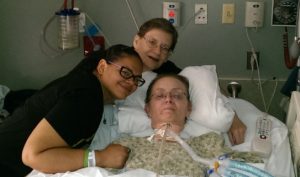Frontotemporal dementia. The frontotemporal lobe is the “thinking part of the brain”, the part that regulates executive function, decision-making, forethought and speech and communication. In about half of people with ALS, there can be changes to this part of the brain, but many actions, reactions and behaviors are chalked up to “the normal anxiety of a terminal diagnosis”. Some studies show that in about a quarter of ALS patients, the brain changes can be significant enough to warrant a diagnosis of dementia, specifically FTD. Mary’s neurologist once told me that she believed all ALS patients will develop FTD if they live long enough.
Soon after Mary’s diagnosis, I learned about FTD from other caregivers, and started to keep an eye out for changes in Mary’s behavior. Because the changes were so subtle at first, and the physical disease progression so fast, I missed the early signs. She picked arguments with me. She didn’t want to hear about how I felt about anything. She refused to make decisions. She would get easily angry at the littlest things. Any discussion about the future was met with “I have to live in the moment”, which ending up leaving me to make her decisions for her once she could no longer communicate. Despite an insane amount of anxiety, she refused to take any anti-anxiety meds. Despite her high level of pain, she refused to take any pain meds until she was almost locked in, and even then, at least when she was still at home, she would dictate the dosage, which was often well below what the prescription was written for. She had to watch you fill the meds, fill the formula – she didn’t trust anyone not to poison her. She would tell me in tears that a caregiver had pinched her, and would refuse to let them back, so I would call the agency and fire the caregiver and beg them to send a new one. She wouldn’t let me trigger the Power of Attorney even though she could no longer sign her name. She accused me of trying to gaslight her. She would tell the Medicaid case worker and the social worker that I needed a break, that “Denise needs to have a life”, but any time I made plans to meet a friend or even go to the garden, there would be a minor crisis and she would get me to stay. I would leave for work, and she would say “How would you feel if I died while you were gone?”
I still didn’t figure out that it was FTD until after she had been trached and vented, and was back in the hospital. She could only communicate by moving her mouth, and I would spend hours lipreading her, unable to figure out what she was saying. I would repeat back what I had seen – complete word salad nonsense – and she would emphatically agree that was what she had said. I would go to visit her after work, and she would be furious that one of the nursing students was treating her like a baby. When I would try to leave to go home, she would tell me to lock the window so that the “bad people” couldn’t get in – I had to show her that it was locked with a screw lock. She would tell me to have the nurses tie her down so that she wouldn’t wander around, and I would have to tell her that she hadn’t been able to walk for over a year. She would complain that the nurses wouldn’t let her go to the bathroom – and I had to tell her she was paralyzed. Then she would look shocked and ask, “why?” and I would explain to her again and again that she had ALS, that she was breathing on a ventilator, that the place she thought was her bedroom was the hospital room she had been living in for months. Telling her again that she had ALS became an almost daily occurrence.
At the end of May 2015, I finally called the ALS Neurologist and told her I suspected Mary had FTD. She met me at the hospital one Saturday morning, and with me interpreting (most people couldn’t read her lips), she asked Mary the basic questions to determine if she was “oriented” in time and place. Mary knew what year it was, who the president was, that she was in the hospital in Portland. She answered everything correctly. The doctor looked at me like “why would you think she has FTD?” I dipped my head at her, turned back to Mary and asked, “Mary, WHY are you in the hospital?” She looked back and forth at us, completely perplexed, and hesitantly answered, “Drug overdose?” The doctor’s eyes got very round, and she agreed to the FTD diagnosis. I quickly got the letter stating that Mary was no longer of sound mind to make her own decisions, and I activated the Power of Attorney. That was one of the hardest things I ever had to do.
Over the next several months, the FTD got worse. Some days, she wouldn’t know who I was. Some days, my phone would ring at 2am because she was in a panic and the nurses couldn’t figure out why. I would Skype with her and translate, and about 45 minutes later I would realize that the TV was on the “relaxation” channel and she was afraid she would drown in the waterfall and ocean waves on the screen. She had lost her sense of reality. For the rest of her life, her sense of reality would appear in short glimpses, but mostly the Mary I had known was no longer there.
